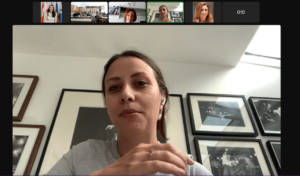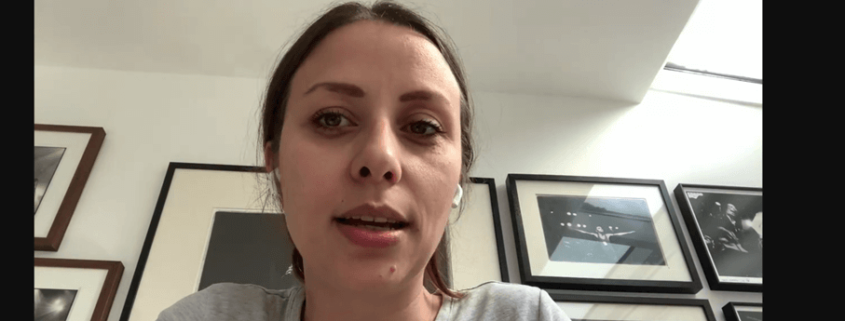For the third time in her term of office, on Tuesday, 10 May 2022, MEP Irena Joveva met with secondary school students from Novo mesto Gymnasium. On the occasion of Europe Week and the Year of Youth, she spoke about youth issues and current events in Slovenia and beyond. She considers it important to talk to young people in order to raise awareness about the importance of their participation in shaping the policies that affect their future, something which should also be fostered at home and at school.
First, she explained how she has been manoeuvring between her work as an MEP and motherhood over the past year, as it was noticed that her then nine-month-old daughter Mila was keeping her company in the European Parliament chamber during the vote: “I gave her some papers to distract her, some toys and some water, and that was it. Nobody minded her presence, everybody was happy with her being there and it was all very positive –she only made the atmosphere more pleasant.” She also described what her job is like: “It’s a 24/7 mission, both motherhood and being an MEP. Even if you are not working at a given moment, you can never switch off.”
According to Joveva, political discourse in Slovenia is currently at its lowest point. The culture of dialogue in the European Parliament is better, but even there you find some MEPs who are very extreme, manipulative and dangerously populist. They are, however, much more marginalised.
“No one in the European Parliament works with the MEPs from extreme political groups with hideous positions. It is clear who is OK and who isn’t, while in our National Assembly it is unfortunately much less clear cut. I cannot imagine the President of the European Parliament or the President of the Council communicating in the way that top-level politicians do here.”
She said that her colleagues in Brussels find it inconceivable that this could be happening in Slovenia.
Joveva also pointed to the extremely hostile communication on social networks, where she, too, has been criticised for her looks, her background and, more recently, her motherhood and her career. “I am sure that if I were a man, there would be less of this. Nobody discusses male colleagues, who are also fathers to young children, this way,” she added. She has also been criticised for her youth and alleged inexperience. But she entered politics also because she believes that the future of young people should be decided by people who are not burdened by the past, scandals, extreme views, or who are advanced in years. “Young people are increasingly important, not least in EU policies. The fight for young people is very prominent in the context of environmental issues and employment,” she said, adding that political education should be cultivated both at home and at school, and that she is always happy and pleased to respond to invitations to meet young people. She impressed on the audience to make use of all the programmes available in the framework of EU projects, especially the Erasmus exchange programme. She feels it is important to foster curiosity and consideration: “This is crucial, politicians and people in general should become more considerate. Considerate people see and feel other people more and can distinguish right from wrong.”
 A large part of the discussion was devoted to current events in Slovenia and Europe. Joveva explained that the elections in France and Slovenia showed that people do not want extreme policies and division. She repeated how important it is to exercise the right to vote, otherwise one should not feel entitled to be critical of the elected representatives of the people. She also expressed dissatisfaction with the way the campaign had been run and with the political messages directed at young people: “I don’t think there was enough focus on young people. Apart from the platitudes that are heard time and again, there wasn’t much substance.”
A large part of the discussion was devoted to current events in Slovenia and Europe. Joveva explained that the elections in France and Slovenia showed that people do not want extreme policies and division. She repeated how important it is to exercise the right to vote, otherwise one should not feel entitled to be critical of the elected representatives of the people. She also expressed dissatisfaction with the way the campaign had been run and with the political messages directed at young people: “I don’t think there was enough focus on young people. Apart from the platitudes that are heard time and again, there wasn’t much substance.”
Joveva is worried about the war in the heart of Europe: “It is very difficult for me to express anything but condemnation – what is happening is horrific, but also extremely dangerous. We all hope that the situation will calm down soon, but we have to be realistic – it doesn’t look like it will. The European Parliament and the MEPs are doing everything we can to at least make the situation easier for people, although we acknowledge we cannot solve it.” The war is also resulting in a new wave of refugees, and the MEP stressed that all refugees and people fleeing dangerous areas must receive equal help. She was critical of Poland and Hungary, which among other things have been blocking the adoption of the legislative package governing the EU’s migrant policy in the Council for several years.
“I do find it somewhat ironic that Poland and Hungary, which are holding up the adoption of migration legislation, are now bearing the brunt of the refugees from Ukraine.”
Multiculturalism is one of Europe’s most important values, as the EU’s motto is ‘United in diversity’. Coming from a multicultural family, she sees this as her advantage. “I have always said that I am proud of my origins and of my homeland, which is Slovenia. I was born here, my father is Bulgarian and my mother Macedonian. This is reflected in everything else: if you have lived with people of different religions, backgrounds and, after all, political beliefs your whole life, this is reflected not only in your personality but also in your profession – especially in my case,” she concluded.




Leave a Reply
Want to join the discussion?Feel free to contribute!